Ten Great Places For Asian Food
Asian cuisine in Israel has had an interesting evolution. It started from the top down, with elite restaurateurs introducing Japanese food - primarily sushi - to a novice public. Later, however, as a younger generation of Israelis began returning from their after-army trips to the Far East, the trend reverted to from the bottom up, with Thai and Indian restaurants becoming the fastest growing segments of the market. Today, the best and most popular restaurants are just as likely to be pan-Asian - offering dishes representing a cross section of cuisines - as dedicated to the culinary delights of one particular country.
The list below comprises restaurants that offer everything from the broad strokes of multi-national cuisines to the narrower reaches of regional ones. They appear in alphabetical order, range from fancy to casual, hail from both the big city and suburbs, and include restaurants that are certified kosher.
Dosa Bar
The sign on the restaurant says "Indian street food". The description on its Facebook page (where it has a ranking of 4.9 out of 5) says "health food restaurant". Dosa Bar is 100% kosher, vegan and gluten-free. It is also decidedly no-frills: most of the outdoor tables are high, with bar stool seating; indoor tables are low, with stools for seats.
The alcohol menu, in Hebrew only, lists chasers, cocktails (although no specialty ones), sangria and three house wines, and three brands of draft beer on tap (Israeli and imported). The non-alcoholic beverages are bottled natural juices - preservative-free and with no added sugar.
The food menu, in both Hebrew and English, is not extensive. There is a daily thali - a meal of three cooked vegetable dishes, rice, and a salad. The vegetable dishes rotate daily; the stewed chickpeas are delicious, while the malai kofta - which is characterized by its trademark cashew and tomato gravy - is excellent. The thali comes with assorted chutneys - mint, beet and coconut - as well as vegan raita.
Naturally, the star of the show here are the dosas, a staple of southern India. These crispy crepes, made of a fermented batter of urad lentils, are described by the color of their fillings: orange, green and purple - plus yellow, denoting the classic spicy potato masala dosa.
Interestingly, the courses here are modular: the filling of one dosa can be a side dish for another; the curries from the thali can be paired with either rice or uttapam - a kind of soft pancake made from the same batter as the dosa, with vegetables actually baked into the batter
The main condiment served with dosas is sambar, a savory tamarind-lentil sauce. The same salad that accompanied the thali comes with the dosas as well. There is also a tasty quinoa salad, with carrot, sprouted black lentils scallions, parsley, dill and celery, dressed with a date vinaigrette, beet tehina and vegan tzaziki.
The desserts at Dosa Bar are gluten-free and contain no refined sugar. These confections are small gems - an exquisite balance of creamy and crunchy, like Indian petit fours.
If you like dosas, these are likely the best you will find in Israel. And if you haven't tried one yet, this is the place to do it, along with the lighter, fluffier uttapam.
Dosa Bar. Kosher. 188 Ben Yehuda St., Tel Aviv. Tel. (03) 659-1961. Moderately priced.
Hiro
The Hiro Freestyle Ramen Bar by Aharoni serves a classic Japanese dish, but it is not a Japanese restaurant like its counterparts. For one, it serves no sushi. In fact, its menu is extremely limited: aside from ramen - the noodle soup that is a meal in a bowl - it serves only Asian buns, gyoza (Japanese dumplings) and small salads. Yet this simple ramen bar - the first in Israel - has been so successful that it has now spawned a twin eatery: a small restaurant owned and operated by the same man - celebrity chef Yisrael Aharoni.
The restaurant has both bar and table seating, although quite a few table seats are without backs; and since the restaurant does not take reservations, if your party does not take up a whole table, it will be filled with newcomers.
The restaurant has a few upgrades: mixed specialty cocktails, for example, made with Japanese ingredients, such as miso, in an otherwise sweet drink of dark rum with caramelized banana. The cocktails at the Sarona location are pre-bottled. Both serve just one brand of beer: Leo, from Thailand, in bottles.
The new restaurant menu is in Hebrew only, so far, although the wait staff speak good English; the Sarona ramen bar has English menus. The difference in the food menu is that the restaurant serves duck and pork, both in the ramen and buns, as well as in two dry noodle dishes that are not offered in Sarona.
Hiro's signature dish is the gochu ramen: braised brisket, Korean fermented chili paste, bok choy, shiitake mushroom, daikon radish, spring onion, nori seaweed and marinated egg. Other ramen versions feature chicken, ground beef and tofu; the latter is a vegan option, which exists in every menu category.
Besides the ramen - obviously - recommended dishes include the chicken gyoza, the beef buns, the noodles with perfectly seasoned ground pork, and the sliced pork in spicy marinade with chopped cashew nuts.
Neither venue offers desserts, which is not a problem in Sarona, where plenty of booths in the marketplace offer a wide variety of sweets.
Hiro Freestyle Ramen Bar. Not kosher. Sarona Market and 16 Mikveh Yisrael St., Tel Aviv. Tel. (03) 558-3505. Inexpensive.
La Missada
The name might be a combination of French and Hebrew, but the cuisine is Chinese - prepared by a chef who hails from Shanghai and was brought to Israel by restaurant owner Tony Lalloum, who previously owned kosher Chinese and sushi restaurants in Paris.
La Missada offers no specialty cocktails, although there are both Western and Japanese spirits, as well as one brand of bottled beer from Asia. There is an adequate French and Israeli wine list, with decent house red, white and rose wines available by the glass.
The menu categories start with entrées - three steamed dim sum dumplings, and four fried appetizers, including fake shrimp tempura. Next are four Soups: the familiar wonton, and one called Peking. The former features tasty, plump, chicken-filled wontons (kreplach) in a soy-infused broth, while the latter is a unique combination of egg drop and hot-and-sour soup.
There are three Salads, one with chicken, another with fake shrimp, and one that it is all vegetables. Otherwise, vegetarians are limited to two Noodle dishes (another menu category) or steamed edamame.
The main courses are divided into Chicken (12), Fish (6), Lamb (5) and Beef (10), many of them prepared in the same way, with the protein ingredient interchangeable. According to Lalloum, the most popular dishes are the Beef Szechuan - which is not as spicy as many versions are - and the Chicken with Cashew Nuts.
Desserts are both of the Western variety, and those that seem to be found in most Chinese restaurants, like fried bananas. One that is unique to La Missada is the homemade nougat ice cream, which tastes enough like candy that it is an acceptable pareve substitute.
La Missada is open Saturday night after Shabbat, and serves business lunches on weekdays (from noon to 15.00) that start at NIS 49.
La Missada. Kosher. 77 Ahuza St. , Raanana. Tel. (09) 769-9061. Moderately priced.
Ma Pau
This restaurant, started by the children of an immigrant from India, serves "Mumbai food". In the short time Ma Pau has been open - just over a year - it has grown so popular that it has already expanded to two outlets.
The decor of both branches is quite basic, evoking the atmosphere of a "workers' restaurant". The flavor of India is apparent, not just in the smells wafting from the kitchen but also the contemporary Indian music emanating from the music video clips projected on the wall.
There are only two specialty cocktails - the "Mumbai style" (vodka, ginger, lemon and mint served in chilled copper mugs) and a "Mumbai sangria" - but there is plenty of alcohol, served primarily as shots. There is a very limited wine list, but domestic and imported beers are available on tap and in bottles.
The food menus in both restaurants are very similar - plenty of vegetarian and vegan options - with the notable exception that the HaHashmoanim branch also serves fish and seafood. The other major difference is in the schedule: the Nahalat Binyamin branch is closed on Shabbat, while its counterpart is open Friday night and Saturday.
The menus start off with chat, typical Bombay snacks, listed here as appetizers. You could make a whole meal of them, especially the onion bhajji (fritters battered in chickpea flour), chicken samosas, and batata wada (fried sweet potato mash). The next menu category is chappati/pau - the former being franki (rollups in traditional Indian flatbread), and the latter sweet bun sandwiches.
Main courses are thalis (mixed stewed vegetables and rice), curries, biryanis (pilafs) and dosas. Recommended are the chicken tikka masala, dal (yellow lentils), the shrimp curry (you may specify the level of spiciness) and the palak paneer (cheese cubes in a spinach stew thick enough to spread). If you do not finish your order, do not hesitate to take leftovers home; some of these dishes taste even better after standing overnight.
Finally, the dessert menu has undergone a recent upgrade, notably the introduction of a new star: gulab jamun, light and airy cheese balls in a syrups studded with pistachio pieces. And the fruit lassi (yogurt drink) - banana or mango - is exceptional, thick, with a touch of cardamom.
Ma Pau. Not kosher. 59 Nahalat Binyamin and 105 HaHashmonaim , Tel Aviv. Tel. (03) 773-9797. Moderately priced.
Minato
Minato began as a kosher sushi bar in Caesarea, founded by a partnership of an Israeli and a Japanese chef. Its success has led to the opening of a second branch in an office building plaza in Herzliya Pituach, where the restaurant offers a full menu of authentic Japanese dishes.
There are no specialty cocktails, but our knowledgeable waitress recommended as an apéritif a small snifter of premium choya (plum liqueur) garnished with berries - a truly inspired drink. There is also warm or cold sake, Japanese and Israeli beers in bottles, and a limited wine list with all wines available by the glass.
With our drinks came a bowl of steamed edamame in coarse salt, which turned out to be as addictive as peanuts. An endless supply will be brought to your table throughout the evening, whether you order drinks or not.
First courses consist of three soups, four salads, and three fish tartares, whose recommended dishes are, respectively, the Agedashi tofu in broth, the wakame seaweed salad, and the tuna tartare.
Subsequent menu categories are From the Grill, skewers of vegetables, chicken, salmon or beef; From the Oven, two baked fish dishes; Deep Fried, including tempura; and From the Pan, fish and vegetarian dishes, including traditional sukiyaki. Outstanding dishes in these categories include the Piri Kara Yaki casserole, baked sea bream in Minato's secret mayonnaise sauce; the Gyu Kushi, entrecôte wrapped around asparagus, served on a sizzling platter; and the Salmon Matsuri, seasoned pan-seared salmon wrapped around avocado, asparagus and salmon caviar.
Three whole pages are dedicated to raw fish: sashimi, nigiri, maki, temaki, inside-out rolls and special rolls. In addition, daily specials, depending on the fresh catch,
are listed on the blackboard.
Desserts, explained by the wait staff, are not to be missed, especially the assortment of Japanese-inspired chocolates.
Minato, Kosher. 8 HaMenofim St., Herzliya. Tel. (09) 773-1703. Moderately priced.
Nini Hachi
It is no small feat to be ranked the #1 Japanese restaurant in Tel Aviv on TripAdvisor, especially when that restaurant does not serve seafood, because it is kosher. Yet that is the status that Nini Hachi has managed to achieve. While the restaurant specializes in sushi and Japanese cuisine, there is a smattering of pan-Asian dishes. There are two floors of tables, stools at a small bar where three sushi chefs are busy at work, and two areas of outdoor seating, in an enclosed area as well as tables on the sidewalk.
Nini Hachi offers no cocktails, but there is a dedicated sake menu, along with a limited wine list, as well as imported and domestic beers on tap and in bottles. The wait staff explain the different kinds of sake, which can be ordered warm or cold. On Fridays, alcohol is 50% off.
The regular menu categories are starters, first courses, sashimi dishes (which reappear on the sushi menu), salads, skewers, soups, noodles and rice dishes, and teppenyaki (grilled chicken, fish, meat or vegetables, served on a hot skillet). Recommended dishes here are the al dente asparagus and mushrooms teppenyaki sprinkled with sesame seeds; the Nini sashimi, two kinds of thinly sliced raw fish (usually tuna and salmon) served in the house sauce and topped with strips of carrots, chives and ginger; and the chicken gyoza, fried Japanese dumplings.
The sushi menu is divided into salmon, tuna, vegetables, white fish, sashimi, nigiri and combinations. There is also a category of "special rolls", which includes tempura and cooked fish or chicken - and even a Bamba roll, with peanut butter!
Recommended sushi are the yellowtail, avocado and crispy beet; the Rock 'N Roll, spicy tuna and avocado topped with seared tuna, green onion and ponzu sauce; salmon crunchy, salmon and avocado wrapped in salmon and tempura flakes; and Saturi, salmon and avocado wrapped in three kinds of fish and - believe it or not - seasonal fruit, such as fresh strawberry.
There are two desserts: three lollipops (passion fruit, caramel and mojito), or six petits fours, with an emphasis on chocolate. Both are washed down nicely by fragrant jasmine tea, served in a traditional Japanese teapot. Nini Hachi does a brisk take-away and delivery business.
Nini Hachi. Kosher. 228 Ben Yehudah St. , Tel Aviv. Tel. (03) 624-9228. Moderately priced.
Nithan Thai
Nithan Thai, which introduced royal Thai cuisine to Israel, remains one of the most stunning Asian restaurants in Israel, while pivoting slightly to a wider panoply of Southeast Asian cuisine, based on Thai ingredients. The restaurant not only reached new heights in Tel Aviv with its broader menu, its international chef, Shahaf Shabtay, has just opened Nithan Thai Berlin.
The elegant atmosphere is reflected in the emphasis on aesthetic presentation, attention to detail and impeccable service. Even the menu headings - Water, Inner Peace, Sunrise, Golden Sun and Sound - evoke sensibilities, rather than mundane food categories.
The eight specialty cocktails are redolent with spices from the Orient, while the non-alcoholic natural juice combinations are practically as exotic. There is a well-curated international wine list, and premium international and domestic beers.
The restaurant is happy to devise a tasting menu, collated from all five of the menu's sections, based on diners' preferences. The kitchen is also eager to please vegetarians; Nithan Thai even has a dedicated vegan menu.
Recommended dishes include the Red Farm, fresh sea bass in rice paper with a pear yakitori dip; Thong Kam, beef Bangkok-style wrapped in pandan leaf; Golden Goong, giant crystal shrimp tempura with al dente baby asparagus in an amazing yogurt-dashi sauce; the Sea Curry; and the Thai beef, filet mignon in a morel mushroom and artichoke sauce.
The unique dessert menu is printed on a small box containing Asian spices used in the sweets. Top choices are the Macha Balls, small cream puffs dusted with macha powder served with dips of caramel miso and Thai basil-infused white chocolate, and the Pineapple Art, pieces of brioche soaked in a spiced syrup and topped with roasted pineapple, meringue and pecan crumble, accompanied by a scoop of coconut sorbet.
Nithan Thai is understandably expensive, but there is a business lunch menu served weekdays until 17.00 that can cut the cost of a two-course meal nearly in half.
Nithan Thai. Not kosher, 21 Ha'arba'a St. , Tel Aviv. Tel. (03) 560-0555. Expensive.
Oyamaa
Oyamaa, which prides itself on practicing "the art of Asian kitchen", is located in Petah Tikvah's Yakhin Center, a modern shopping mall with plenty of convenient outdoor parking right at the restaurant's doorstep. The interior decor centers around handsome light wood, with booths, tables and comfortably upholstered bar stools surrounding a central bar. While the cuisine is pan-Asian, the background music is contemporary Western music.
The full bar's specialty cocktails are classics with Asian twists, such as tropical gin with lemongrass, and a fruity rum drink with yuzu. There is a limited wine list (with all available by the glass) plus a small selection of sake. Imported and domestic beers are available on tap and in bottles.
Not only does the detailed English menu list pan-Asian dishes in no fewer than six categories: there is also a separate sushi section delineating maki, sashimi, nigiri and sushi rolls. Icons symbolize dishes that are (or can be) vegetarian, piquant, or hot and spicy.
From the Imperial Garden comprises five salads, including a tasty seafood salad of shrimp and calamari with glass noodles, mushrooms, cherry tomatoes, baby radishes and celery, in a chili-lime vinaigrette. Bread and Dumplings has two examples from India, two from China and one from Japan -- steamed and seared chicken gyoza that are plump and flavorful. Soups and Casseroles include Japanese and Thai soups, Indian and Thai curries, and one Vietnamese pho - noodles awash in a large bowl of plentiful broth.
Main course categories are Noodles and Flaming Skillet, Fish and Seafood, andThe Great Continent: Meat and More. The first category covers a wide range of Asian cuisines, including a representative dish from Malaysia, something not often found in Israel; seize the opportunity and enjoy egg noodles with chicken, basil, broccoli, green pepper, onion, coconut milk and roasted peanuts. The second category yields three shrimp and two fish dishes, while the final category contains two slightly Japanese takes on Western dishes that would appeal to less adventurous souls - schnitzel and hamburger - as well as Indian-inspired versions of other familiar Israeli favorites - kebab and pargit (pullet).
For some strange reason, the dessert menu is only in Hebrew, and lists basically common Western desserts, including three chocolate options. Oyamaa offers delivery service, as well as discounted business lunches on weekdays.
Oyamaa. Not kosher. 17 Derech Yitzhak Rabin, Petah Tikvah. Tel. (03) 923-5638. Moderately priced.
TYO
The slightly faded grandeur of the two-storey building in the shadow of Shalom Tower belies the contemporary elegance inside, where an interior highlighted by mirrors, leather chairs, and cloth napkins sheathed in decorative sleeves is indicative of one of Tel Aviv's premier Japanese restaurants.
The aesthetics at TYO (the airport code for Tokyo) extend to food presentation as well, beginning with the restaurant's specialty cocktails, which bear such evocative names as the bloodshed martini and black salt margarita. Not surprisingly, there is also a fine selection of premium sake - served from a carafe on a bed of ice in its own tray - as well as an international wine list that features world-class vintages.
The menu is divided not only into such standard categories as starters and main courses, but also according to Japanese cuisine specialities, like yakitori and tempura. Interestingly, the sushi menu differentiates between sushi and classic sushi, along with familiar sub-categories (nigiri, tamaki, combinations).
If there is such a thing as a signature dish at TYO, it might well be the Gunkan trio - small, shrine-shaped mounds of rice topped not only with fresh raw fish but also (in two instances) foie gras, a unique combination that is truly inspired. Other recommended dishes include the agedashi tofu, the grouper tataki, and a seaweed salad in a remarkable dressing.
Desserts also reflect the restaurant's tradition of beautiful presentation and innovative combinations, especially the Mr. Bean - green tea ice cream atop asoka bean cake over hot earl grey sauce, surrounded by candied hazelnuts, with warm mint caramel sauce drizzled tableside over everything.
Attention to detail is evident both in the homemade preparation of the wasabi and pickled ginger, as well as the impeccable service. Such excellence does not go cheap, but there is a business lunch menu representing good value weekdays until 16.00, and a Saturday business lunch for NIS 90.
TYO. Not kosher. 7 Montefiore , Tel Aviv. Tel. (03) 930-0333. Expensive.
Vong
Vong Vietnamese Kitchen, one of a slew of restaurants at the lower end of Rothschild Boulevard, claims to be the only eatery in Israel serving exclusively Vietnamese cuisine. It ascribes its authenticity to Van, the Vietnamese wife of one of the owners, and Lior, the chef who trained in Vietnam and now supervises a cadre of Asian chefs in the kitchen.
Vong's dedicated alcohol menu boasts an impressive list of specialty cocktails, starting with nine exotic blends that use Asian herbs and ingredients to create drinks that range from sweet to spicy hot, and extending to homemade spiced shots of straight liquor. There is a limited international wine list, and both imported and domestic beers.
When it comes to food menus, besides Hebrew and English, there is also a vegan menu, in that bizarre Israeli style of category headings in English but all the names and details in Hebrew only. The extensive regular menu has no fewer than seven categories, all intermediate or large in size, and most eminently shareable. Menu symbols denote spicy, very spicy, gluten-free available and vegetarian option available.
The Soups section is not to be skipped, even on a warm day, since it includes the national dish of Vietnam - pho, practically a meal in a bowl - and a wonderfully aromatic and complex seafood soup, accompanied by fried sticky rice balls with crab meat.
The Salads category includes another signature dish of Vietnam (whose name is reflected in the name of the restaurant), Cha-Ca-La-Vong - grilled morsels of fish fillet with warm noodles and assorted cold herbs and vegetables. The Banh and More section is the home of sandwiches made with steamed "cloud buns" - the largest I have seen in Israel.
Other categories are Rolls and Dumplings, five rolls whose wrappings can be either leaves or dough, plus three kinds of steamed dumplings; Wok and More, comprising nine noodle dishes; Rice and More, which includes fried rice options; and the Comfort Curry Zone, whose five curries are more likely to be mild and complex than fiery.
Desserts are explained by the wait staff, and comprise three Asian and three Western options, the latter reflecting French influence in Indochina. We enjoyed the tapioca beads in coconut milk, with fresh melon cubes and sugared peanuts. Naturally, there is Vietnamese coffee, sweetened with condensed milk.
Vong Vietnamese Kitchen. Not kosher. 15 Rothschild Blvd., Tel Aviv. Tel. (03) 633-7171. Moderately priced.



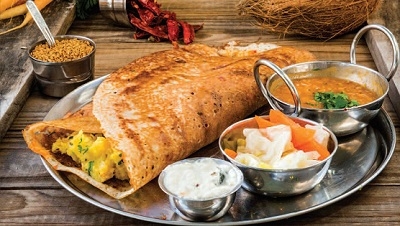
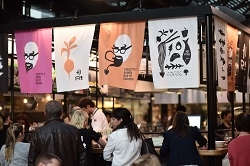
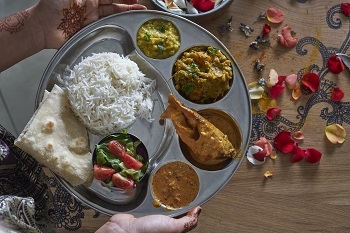
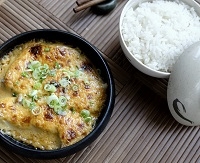
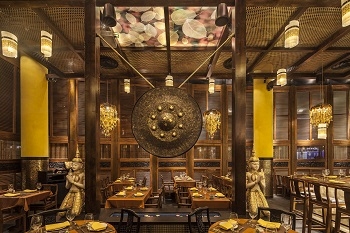
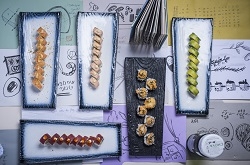
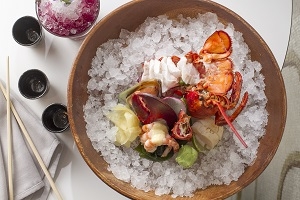
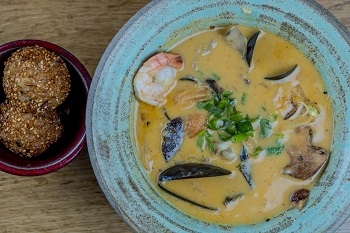




Comments